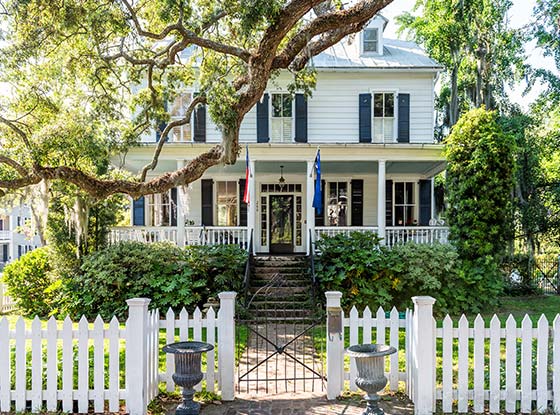Few purchases give you a sense of pride and accomplishment like buying a new home. From white picket fences and lush green grass to cookouts with neighbors and holidays with the family, owning a home is magical. Like most great things, though, enduring the home-buying process takes a lot of work. There are many steps to take and difficult decisions to make along the way. One of the most crucial decisions is what type of home loan and mortgage broker to choose. Whether it's your first time buying a home or you're a seasoned owner with multiple properties, you will need a trusted mortgage broker in Charleston, SC, with your best interests at heart.
If you're like most people, you need a mortgage professional whose top priority is their customers - an expert who can provide accurate advice and guidance so you can make educated decisions. That's where Mission One Mortgage comes into the picture.
DifferenceThe Mission One Mortgage Difference

Whether you want the best interest rates or don't know where to start in the home-buying process, Mission One Mortgage can set you up in the right direction. From getting you pre-qualified to buy a home to securing a veteran's loan, Mission One Mortgage is the trusted solution you need. As Charleston natives, we're proud to serve the Lowcountry and all of South Carolina with trusted mortgage brokerage services.
Unlike some mortgage companies in Charleston, SC, we bring years of high-level experience and insight to the table. Having worked with hundreds of clients during our time in business, we know you're probably going through a range of emotions right now. Buying a new home can be a scary process, especially for first-time buyers. That's why we make every effort to make ourselves accessible and available for clients. Our primary goal is to help you make the right mortgage for your family and your budget.
Our Services
- Mortgage Broker Charleston, SC
- The Mission One Mortgage Difference
- Why Should I Work with a Mortgage Broker in Charleston, SC
- Exploring the Benefits of Working with a Mortgage Broker
- Common Home Loan Options in South Carolina
- Home Mortgage FAQs
- Mission One Mortgage: Turning Dreams into Reality, One Mortgage at a Time
Service Areas
We know that many home loan officers have horrible reputations. Some brokers only see their clients as transactions, and a means to make quick money. They come off as impatient and pushy, failing to understand that this is a very big decision for you. At Mission One Mortgage, we take the opposite approach. We encourage our clients to take as much time as needed to ask us questions and review mortgage documents. We could say that our mission is to exceed your expectations, but we'd rather just show you. From assistance finding FHA, VA, or other loans to refinancing your current mortgage, Mission One is the team you can trust.
Here are just a few reasons why home buyers choose Mission One Mortgage:
Why Should I Work with a Mortgage Broker in Charleston, SC?

Most people simply don't have access to the hundreds of thousands of dollars needed to purchase a home with cash. Instead, they take out a mortgage loan to buy a home. Unfortunately, many homebuyers are anxious to get the ball rolling and, due to their excitement, fail to shop around for the best mortgage rates. To some degree, avoiding this step makes sense, as it requires a lot of legwork and research to get the job done. For those not wanting to spend hours researching a reasonable mortgage, there's an alternative to consider - working with a mortgage broker.

To understand the benefits of working with a mortgage broker, you must first understand their role in the home-buying process.
What Does a Mortgage Broker Do?
Your mortgage broker is a third party that works to connect you with mortgage lenders. Essentially, a mortgage broker works as an intermediary between a person who wants to buy a home and the entities offering loans to buy a home. The mortgage broker works with both the borrower and lender to get the borrower approved. They also verify and collect paperwork from the borrower that the lender needs to finish a home purchase. Typically, mortgage brokers have relationships with several home loan lenders. Mission One Mortgage, for example, has access to 50 different lenders, which gives us a wide range of home loans in Charleston, SC, from which to choose.
In addition to finding a home loan lender, your mortgage broker will help you settle on the best loan options and interest rates for your budget. Ideally, your mortgage broker will take a great deal of stress and legwork off your plate while also potentially saving you money.
Help with the Pre-Approval Process
If you're ready to buy a home, getting pre-qualified is a great choice that will streamline the entire process. Your mortgage broker makes getting pre-approved easy by obtaining all the documents needed to get you pre-qualified. In taking a look at your application, they will determine if you're ready for the pre-approval process. If your application needs additional items, the mortgage company will help point you in the right direction to ensure your application is as strong as it can be. Your mortgage broker will also walk you through the different types of loans, from Conventional and FHA to VA and USDA.
In order to be pre-approved for a home in South Carolina, you must have the following:
- Two Years of W2 Forms
- 30 Days of Pay Stubs from Employer
- 60 Days of Bank Statements
- A Valid Driver's License
BenefitsExploring the Benefits of Workingwith a Mortgage Broker

Most people choose to use a mortgage broker because they have access to different lenders and interest rates. But a great mortgage broker brings more to the table than a choice of lenders.
Save You from Unneeded Stress:One of the biggest advantages of hiring a mortgage broker is that they can find and vet loans while managing the mortgage process on your behalf. The best mortgage companies, like Mission One Mortgage, hire brokers who are experts at keeping underwriting on track, coordinating with relevant parties, and handling all paperwork involved. At the end of the day, mortgage brokers save you stress and time and often expedite the closing process.
More Access: We touched on this earlier, but it bears repeating: A mortgage broker provides access to a range of loans, rates, and lenders. In fact, many mortgage brokers can get rates lower than what the average person could get from a lender.
Save You Money: There's a chance that your mortgage broker can get your mortgage fees reduced or waived by the lender, which could save you a good deal of money.
Help with Unfavorable Financial Situations: Expert mortgage brokers can often assist in challenging financial situations, like when a buyer has inconsistent income or less-than-perfect credit. Experienced brokers, like those at Mission One Mortgage, are often aware of lenders willing to will work with nontraditional borrowers.
Provide Key Insights: Mortgage brokers share important insights, such as your chances for a home loan approval and exactly how much house you can afford. They can also save you from making costly mistakes based on their years of expertise in the mortgage industry.

Home LoanCommon Home Loan Options in South Carolina

While settling on the best type of home loan isn't as exciting as searching for the home of your dreams, it's equally important. Yes, your Mission One Mortgage loan officer in Charleston, SC, will be happy to help explain the differences between home loans. But understanding the basics ahead of time will save you stress and time in the long run.
Contact Us For Service !
Free Consultation (843) 822-5685
(843) 822-5685
Conventional Mortgages
Conventional loans can be used to purchase a new home or refinance your current one. Conventional loans include fixed-rate mortgages and adjustable-rate mortgages. Generally, borrowers must put down a 3% down payment for owner-occupants, 10% for a vacation property, and 20% for an investment home. If you are able to pay 20% of the total cost of the home, you can avoid private mortgage insurance, which is otherwise required. Conventional mortgages are often preferred by buyers with good credit or people needing a non-owner-occupied mortgage.


FHA Loans
FHA mortgages are issued by the U.S. government and backed by the Department of Housing & Urban Development (HUD). This loan is often preferred by first-time homebuyers because it only requires a 3.5% down payment and offers more flexibility with credit requirements and underwriting standards. FHA loans have several requirements you must meet to qualify. Contact Mission One Mortgage today to learn more about FHA loans and whether or not they're best for your financial situation.
USDA Loans
Also backed by the government, these loans are insured by the U.S. Department of Agriculture and don't require money down. These loans have lower insurance requirements when compared to FHA loans, offer 100% financing if you qualify, and allow for closing costs to be covered by the seller. In order to qualify for a USDA loan, you must live in a rural area, and your household income must meet certain standards. These loans are often preferred by low-income citizens who live in rural parts of South Carolina.


Veteran Mortgages
Also known as VA or Veteran's Affairs loans, these mortgages are reserved for the brave men and women who served in the military. VA loans help provide our military members, veterans, and their families with favorable loan terms and an easy home ownership experience. Often, those who qualify are not required to make a down payment on their home. Additionally, these loans often include less expensive closing costs.
If you are a veteran or the family member of a veteran, contact Mission One Mortgage today to speak with our Vetted VA Professional, Debbie Haberny. Debbie helps our military members, veterans, and their family members obtain home loans utilizing veteran benefits and would be happy to help as you search for a home.
FAQsHome Mortgage FAQs

Do you have questions about the complexities of mortgages and home loans? As your advocate, Mission One Mortgage is here to answer any questions you have about mortgages and the home-buying process. We encourage you to call our office to speak directly with one of our mortgage experts or continue reading below for answers to some frequently asked questions.
Q. I was talking to my spouse about mortgage brokers, and they mentioned the phrase home loan originator. What's the difference between a broker and a loan originator?
A. The mortgage industry is full of confusing jobs and titles, making it easy to confuse roles and responsibilities. Such is the case with mortgage brokers and home loan originators. Though their roles share similarities, a home loan originator in Charleston, SC, works for a bank or credit union, while a mortgage broker works for a brokerage company. Home loan originators and mortgage brokers are both licensed by the Nationwide Multistate Licensing System (NMLS).
Q. I've heard from everyone that you must have mortgage insurance to buy a home. What is mortgage insurance?
A. Essentially, mortgage insurance helps protect lenders if a borrower forecloses on the home they bought. One advantage of mortgage insurance is that when borrowers pay it, lenders can often grant loans to buyers when they might not have otherwise. Though not always required to buy a home, mortgage insurance is often needed for down payments of less than 20%.
Q. I have just been pre-approved to buy a beautiful home in South Carolina. Is there anything I shouldn't do now that I'm pre-qualified?
A. Mortgage companies like Mission One Mortgage, make getting pre-qualified for a home easy. However, as your loan process continues, your lender is required to run a new credit report before closing on a home. For that reason, it's to avoid any activity that might affect your credit score, such as:
- Do not become a co-signer on a loan with someone else.
- Do not quit or change your job.
- Do not apply for new credit cards, automobile loans, or any other lines of credit.
- Do not use your credit card to pay for large purchases, like furniture for your new house.
- Do not avoid payments on current lines of credit, loans, or utility bills.
Q. My brother-in-law recently refinanced his home in South Carolina. What is refinancing, and should I consider refinancing my home too?
A. Refinancing your home basically means you're swapping your current mortgage for a new one, most often with a lower interest rate. If you would like to reduce the term of your loan, lower your monthly mortgage payments, or consolidate debt, refinancing may be a smart option. Many homeowners also choose to refinance if they want to switch from adjustable-rate mortgages to fixed-rate mortgages or to get cash back for home renovations. To learn whether refinancing is a viable option for your situation, contact Mission One Mortgage ASAP, as loan rates change frequently.
Mission One Mortgage: Turning Dreams into Reality, One Mortgage at a Time

Here at Mission One Mortgage, we believe that the best communities begin with the dream of home ownership. Our mission is to make those dreams come true, with personalized service, expert guidance, and good old-fashioned hard work. As one of the most trusted mortgage companies in Charleston, SC, we have years of experience working with a diverse range of clients, from first-time buyers and investors to self-employed borrowers and non-native English speakers.
Though every mortgage situation is different, one thing never changes: our commitment to clients. Contact our office today to get started on an exceptional home-buying experience.
Contact Us For Service !
 (843) 822-5685
(843) 822-5685

Latest News in Charleston, SC
Bulldogs Extend Win Streak With 80-64 Win At The Citadel
Samford University Athleticshttps://samfordsports.com/news/2024/1/6/mens-basketball-bulldogs-extend-win-streak-with-80-64-win-at-the-citadel.aspx
CHARLESTON, S.C. -- The Samford men's basketball team claimed its 13-straight win in an 80-64 Southern Conference victory at The Citadel Saturday afternoon at McAlister Field House.With the win, Samford improved to 13-2 overall and 2-0 in Southern Conference play. The Bulldogs' 13-game win streak is tied for the longest since the 1998-99 team won 13 in a row. The Bulldogs are just one win away from tying the school record of 14 set by the 1960-61 squad. The Citadel fell to 8-7 overall and 0-2 in league ...
CHARLESTON, S.C. -- The Samford men's basketball team claimed its 13-straight win in an 80-64 Southern Conference victory at The Citadel Saturday afternoon at McAlister Field House.
With the win, Samford improved to 13-2 overall and 2-0 in Southern Conference play. The Bulldogs' 13-game win streak is tied for the longest since the 1998-99 team won 13 in a row. The Bulldogs are just one win away from tying the school record of 14 set by the 1960-61 squad. The Citadel fell to 8-7 overall and 0-2 in league action.
"It's always hard to get a road win in our league," Samford head coach said. "It's not easy to win here. We were a little banged up, but I thought we stepped up and played well. I think our depth played a factor in the game. We passed the ball well, we had 18 assists and 10 turnovers, which is fantastic. This was a gutty win."
Samford was led in the win by with 19 points, while playing just 12 minutes in the game. and scored 11 points each for Samford, while added 10 points.
For The Citadel, Elijah Morgan scored 29 points. Quintin Mollora-Brown scored 13 points for The Citadel, while Madison Durr added 11 points.
Samford jumped out to an early 9-4 lead with 16:03 left in the first half after a layup by Campbell. With Samford leading, 13-8, Samford went on an 8-2 run to take a 21-10 lead with 10:02 left in the half following a layup by .
After The Citadel cut the Samford lead to 21-14, Samford scored the next six points to take a 27-14 lead with 3:17 left in the first half after a three-pointer by Campbell. The Citadel fought back to cut the lead to 31-25 at halftime.
Samford opened the second half with a 21-2 run to push its lead to 52-27 with 15:04 left in the game after a three-pointer by . The Citadel then went on a 10-2 run to cut the lead to 54-37 with 12:59 to go after a three-pointer by Morgan.
The Citadel cut the lead to 14 points at 56-42, but Samford pushed the lead back out to 20 points at 64-44 with 8:48 left after a layup by Achor. The Citadel could get no closer than 15 points the rest of the way as Samford finished out the 80-64 win.
Samford will return home to play host to the UNC Greensboro Spartans on Thursday, Jan. 11. The game is set for a 7 p.m. start from the Pete Hanna Center.
FOLLOW THE BULLDOGS For the latest news and information on Samford men's basketball, visit the official website for Samford Athletics at SamfordSports.com. Fans can also follow the Bulldogs on social media at /SamfordSports (Facebook), @SamfordMBB (Twitter), and @SamfordMBB (Instagram).
The Citadel Bulldogs vs. Samford Bulldogs: How to watch NCAA Basketball online, TV channel, live stream info, start time
Scout Staffhttps://www.cbssports.com/college-basketball/news/watch-the-citadel-bulldogs-vs-samford-bulldogs-tv-channel-live-stream-info-start-time-29214889/
Samford is on the road but looking no worse for wear. They have jumped out to a quick 31-25 lead against The Citadel.Samford entered the matchup having won 12 straight and they're just one half away from another. Will they make it 13, or will The Citadel step up and spoil it? We'll know soon.Samford Bulldogs @ The Citadel BulldogsCurrent Records: Samford 12-2, The Citadel 8-6Samford is 8-2 against The Citadel since February of 2018, and they'll have a chance to extend that success on Saturday. Both teams will face...
Samford is on the road but looking no worse for wear. They have jumped out to a quick 31-25 lead against The Citadel.
Samford entered the matchup having won 12 straight and they're just one half away from another. Will they make it 13, or will The Citadel step up and spoil it? We'll know soon.
Samford Bulldogs @ The Citadel Bulldogs
Current Records: Samford 12-2, The Citadel 8-6
Samford is 8-2 against The Citadel since February of 2018, and they'll have a chance to extend that success on Saturday. Both teams will face off in a Southern battle at 1:00 p.m. ET at McAlister Field House. Samford will be looking to extend their current 12-game winning streak.
The oddsmakers set the bar high, but Samford and Chattanooga didn't disappoint and broke past the 160.5 point over/under on Wednesday. The Bulldogs enjoyed a cozy 89-74 victory over the Mocs.
Meanwhile, it's hard to win when you make eight fewer threes than your opponent, a fact The Citadel found out the hard way on Wednesday. They opened the new year with a less-than-successful 80-71 loss to the Catamounts.
The Bulldogs' victory was their tenth straight at home, which pushed their record up to 12-2. They've been dominating during the matchups in that stretch too, as they've won by an average of 23.6 points. As for the Bulldogs, their defeat ended a four-game streak of wins at home and dropped them to 8-6.
This contest is one where the number of possessions is likely to be a big factor: Samford have been smashing the glass this season, having averaged 38.6 rebounds per game. However, it's not like The Citadel struggles in that department as they've been averaging 38.3 rebounds per game. Given these competing strengths, it'll be interesting to see how their clash plays out.
Going forward, Samford is the favorite in this one, as the experts expect to see them win by six points. This contest will be their 12th straight as the favorites (so far over this stretch they are 7-4 against the spread).
Samford is a solid 6-point favorite against The Citadel, according to the latest college basketball odds.
The oddsmakers had a good feel for the line for this one, as the game opened with the Bulldogs as a 5.5-point favorite.
The over/under is set at 152.5 points.
See college basketball picks for every single game, including this one, from SportsLine's advanced computer model. Get picks now.
Samford has won 8 out of their last 10 games against The Citadel.
Longwood Lancers vs. Charleston Southern Buccaneers: How to watch NCAA Basketball online, TV channel, live stream info, start time
Scout Staffhttps://www.cbssports.com/college-basketball/news/longwood-lancers-vs-charleston-southern-buccaneers-how-to-watch-online-live-stream-info-start-time-tv-channel-29219237/
Fortunes may be turning around for Longwood after losing three in a row. They have a bit of a cushion as they currently lead Charleston Southern 34-22.Longwood came into the game with some extra motivation after the defeat they were dealt the last time these two teams faced off. We'll see if they're able to flip the script or if it'll just be more of the same.Charleston Southern Buccaneers @ Longwood LancersCurrent Records: Charleston Southern 4-10, Longwood 12-4If the oddsmakers' predictions hold true, the near f...
Fortunes may be turning around for Longwood after losing three in a row. They have a bit of a cushion as they currently lead Charleston Southern 34-22.
Longwood came into the game with some extra motivation after the defeat they were dealt the last time these two teams faced off. We'll see if they're able to flip the script or if it'll just be more of the same.
Charleston Southern Buccaneers @ Longwood Lancers
Current Records: Charleston Southern 4-10, Longwood 12-4
If the oddsmakers' predictions hold true, the near future looks bright for Longwood. The Longwood Lancers and the Charleston Southern Buccaneers will face off in a Big South battle at 3:00 p.m. ET on Saturday at Joan Perry Brock Center. The timing is sure in Longwood's favor as the team sits on eight straight wins at home while Charleston Southern has not had much luck on the away from home, with 11 straight road losses dating back to last season.
Longwood fought the good fight in their overtime matchup against Winthrop on Wednesday but wound up with a less-than-desirable result. They took a 68-60 hit to the loss column at the hands of the Eagles. The result shouldn't come as a shock considering that's the fewest points Longwood has scored all season.
Longwood struggled to work together and finished the game with only six assists. That's the fewest assists they've managed all season.
Meanwhile, the Buccaneers opened the new year with a less-than-successful 68-61 defeat to the Blue Hose.
The Lancers' defeat dropped their record down to 12-4. As for the Buccaneers, they have traveled a rocky road recently, as they've lost five of their last six matches, which put a noticeable dent in their 4-10 record this season.
Saturday's match is shaping up to be a scrappy matchup: Longwood have been smashing the glass this season, having averaged 41.1 rebounds per game. It's a different story for Charleston Southern, though, as they've been averaging only 32.8 rebounds per game. Given Longwood's sizeable advantage in that area, Charleston Southern will need to find a way to close that gap.
Longwood came up short against Charleston Southern in their previous meeting back in January of 2023, falling 75-63. Can Longwood avenge their loss or is history doomed to repeat itself? We'll find out soon enough.
Longwood is a big 15.5-point favorite against Charleston Southern, according to the latest college basketball odds.
The oddsmakers had a good feel for the line for this one, as the game opened with the Lancers as a 15-point favorite.
The over/under is set at 134 points.
See college basketball picks for every single game, including this one, from SportsLine's advanced computer model. Get picks now.
Longwood has won 6 out of their last 10 games against Charleston Southern.
Stony Brook Seawolves vs. Charleston Cougars: How to watch NCAA Basketball online, TV channel, live stream info, start time
Scout Staffhttps://www.cbssports.com/college-basketball/news/watch-stony-brook-seawolves-vs-charleston-cougars-how-to-live-stream-tv-channel-start-time-for-saturdays-ncaa-29214923/
Stony Brook is giving their home crowd exactly what they were hoping for. They have jumped out to a quick 45-38 lead against Charleston.Stony Brook came into the matchup with some extra motivation after the defeat they were dealt the last time these two teams faced off. We'll see if they're able to flip the script or if it'll just be more of the same.Charleston Cougars @ Stony Brook SeawolvesCurrent Records: Charleston 10-4, Stony Brook 8-6We've got another exciting Coastal Athletic matchup on schedule as the Char...
Stony Brook is giving their home crowd exactly what they were hoping for. They have jumped out to a quick 45-38 lead against Charleston.
Stony Brook came into the matchup with some extra motivation after the defeat they were dealt the last time these two teams faced off. We'll see if they're able to flip the script or if it'll just be more of the same.
Charleston Cougars @ Stony Brook Seawolves
Current Records: Charleston 10-4, Stony Brook 8-6
We've got another exciting Coastal Athletic matchup on schedule as the Charleston Cougars and the Stony Brook Seawolves are set to tip at 6:31 p.m. ET on January 6th at Island Federal Credit Union Arena. We saw both of these teams recently pull out wins they weren't expected to get, so we'll see who gives it right back.
Charleston had already won five in a row (a stretch where they outscored their opponents by an average of 15.4 points), and they went ahead and made it six on Thursday. They walked away with a 73-61 victory over the Pride.
Charleston can attribute much of their success to Bryce Butler, who scored 18 points along with five rebounds. As a matter of fact, that's the most points Butler has scored all season. The team also got some help courtesy of CJ Fulton, who scored five points along with eight assists.
Meanwhile, the Seawolves beat the Huskies 62-53 on Thursday. The win made it back-to-back wins for Stony Brook.
Among those leading the charge was Tyler Stephenson-Moore, who scored 21 points along with three steals.
The Cougars are on a roll lately: they've won nine of their last ten games, which provided a nice bump to their 10-4 record this season. As for the Seawolves, their victory bumped their record up to 8-6.
Saturday's game is one where the number of possessions is likely to be a big factor: Charleston have been smashing the glass this season, having averaged 40.1 rebounds per game. However, it's not like Stony Brook struggles in that department as they've been averaging 37.2 rebounds per game. Given these competing strengths, it'll be interesting to see how their clash plays out.
Looking forward, Charleston is the favorite in this one, as the experts expect to see them win by six points. This will be their first time playing as the favorites on the road this season.
Charleston is a solid 6-point favorite against Stony Brook, according to the latest college basketball odds.
The oddsmakers were right in line with the betting community on this one, as the game opened as a 6-point spread, and stayed right there.
The over/under is set at 153 points.
See college basketball picks for every single game, including this one, from SportsLine's advanced computer model. Get picks now.
Charleston has won both of the games they've played against Stony Brook in the last year.
The Tavern In Charleston, America's Oldest Liquor Store, Has Been Selling Booze Since 1686
Lisa Curran Mattehttps://ca.style.yahoo.com/tavern-charleston-americas-oldest-liquor-230026839.html
Prohibition didn't even put a dent in the timeline of America's oldest liquor store. Located in Charleston, South Carolina, the business known today as Tavern at Rainbow Row kept right on catering to the whims of locals looking for an illicit tipple throughout the nationwide ban on the sale and consumption of alcohol that ran from 1920 to 1933. We can only guess the early 20th-century proprietors of the long-running mercantile were less than impressed by the booze-busting efforts of Elliot Ness and his famed FBI team, the Untouchables. After...
Prohibition didn't even put a dent in the timeline of America's oldest liquor store. Located in Charleston, South Carolina, the business known today as Tavern at Rainbow Row kept right on catering to the whims of locals looking for an illicit tipple throughout the nationwide ban on the sale and consumption of alcohol that ran from 1920 to 1933. We can only guess the early 20th-century proprietors of the long-running mercantile were less than impressed by the booze-busting efforts of Elliot Ness and his famed FBI team, the Untouchables. After all, previous owners of the business, founded in 1686, likely encountered far more menacing characters — notorious 17th-century pirates including Blackbeard, Anne Bonney, and Thomas Tew were known to frequent the area.
The long-running liquor emporium, originally a seafarer's tavern, sits on a bluff overlooking the Port of Charleston. Historic documents and maps found in The Netherlands and in Scotland reveal the centuries-old business has been known by many names during its 300-plus year run, including Tavern on the Bluff, Harris's Tavern, and Mrs. Coates Tavern by the Bay. Through the centuries, it's been both a tavern and a retailer, but not always at the same time. From 1903 until the start of Prohibition, the business operated as a whiskey store. Maybe that's why it so seamlessly went underground for the duration of the U.S. ban on alcohol.
Hidden In Plain Sight
Its location on a bluff near the harbor came in handy during Prohibition, offering easy access for rum runners making clandestine deliveries. To conceal its illicit operation, the then-owners of the storied establishment disguised the business as a run-of-the-mill barbershop. Illegal entrepreneurs made deliveries through an out-of-sight door into a back room where a trapdoor led to a network of tunnels connecting the bootleg distributor to speakeasies throughout the city of Charleston. When the U.S. government repealed Prohibition, the liquor store reopened to the public, never missing a beat.
Located across from Charleston's Rainbow Row — a historic district where the streets are lined with pastel-painted houses — today's Tavern at Rainbow Row still operates as the neighborhood liquor store, but with a twist. In addition to selling commonly known beer, wine, and spirits, the shop specializes in unique commodities, like locally made moonshine and vodka made from seashore black rye, a variety of grain considered extinct until the discovery of a small patch growing on Edisto Island in South Carolina's Low Country. The business also lays claim to occupying the oldest commercial building in South Carolina, complete with the original hardwood floors and a collection of vintage liquor bottles. And, according to some reports, the building may even be haunted.
Disclaimer:





